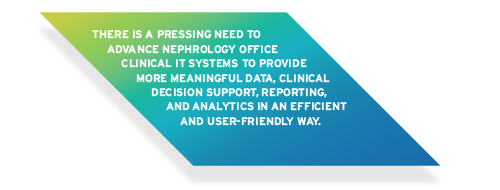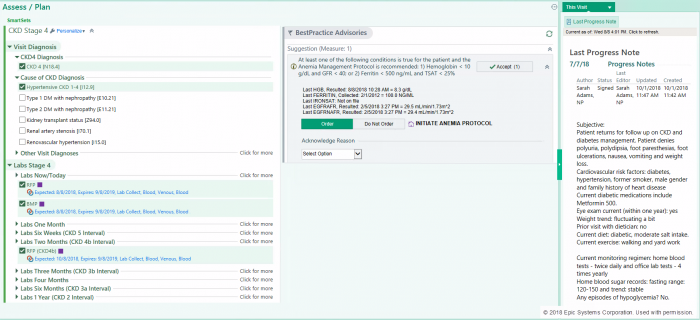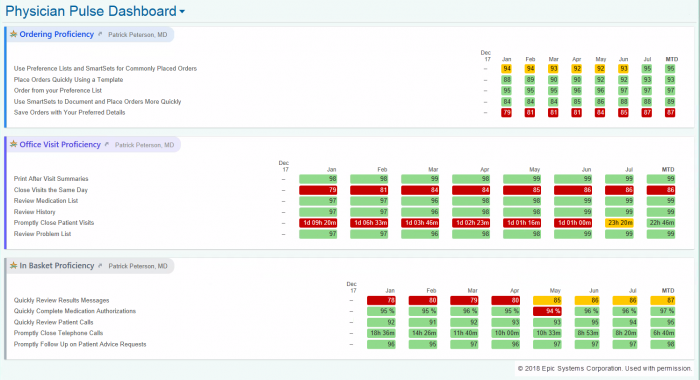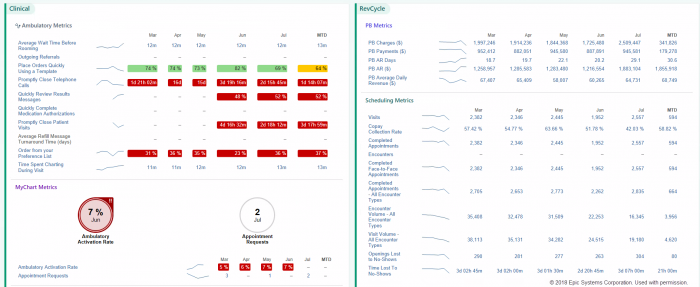THE PROMISE OF IT DELIVERED: ACUMEN 2.0
Nephrologists have long recognized the potential for IT to facilitate progressive and coordinated patient care, yet most have found existing office IT systems to be extremely frustrating. Acumen 2.0, developed by FMCNA in collaboration with Epic Systems, is proving that a streamlined solution tailored to the needs of individual nephrology practices can finally deliver on the promise of IT. Early adopters are already realizing the benefits of the improved nephrology—specific workflows, data, and analytics, as well as a full-featured patient portal.

Nephrologists have a crucial role in effectively managing patients with chronic kidney disease (CKD) and ensuring an optimal transition to dialysis and maintenance for those with end-stage renal disease (ESRD). Studies have shown the benefits of an arteriovenous (AV) fistula as the optimal vascular access method for hemodialysis, and 80 percent of patients starting dialysis with a catheter end up with preventable infections.1 Late referral of CKD patients to a nephrologist is also associated with adverse outcomes.2 Avoiding hospitalizations and improving 30-day readmission rates for patients with ESRD are other care coordination objectives that have not been sufficiently addressed.3
Nephrology office information technology (IT) systems have long been identified as having the potential to facilitate the coordinated, progressive, and comprehensive care of patients with CKD and to support the optimal transition to dialysis for patients progressing to ESRD.4 However, physicians broadly report frustrations and challenges with their electronic health records (EHR) systems, and the transition to EHR use has been identified as a source of physician burnout.5 There is a pressing need to advance nephrology office clinical IT systems to provide more meaningful data, clinical decision support, reporting, and analytics in an efficient and user-friendly way. These improvements would enable nephrologists to more effectively manage and coordinate care for all patients with renal disease.6 To address this specific need, Fresenius Medical Care North America (FMCNA), in collaboration with Epic Systems, has developed Acumen 2.0 as the nephrology office clinical system.
While Acumen 2.0 leverages the depth and breadth of Epic Systems’ technology platform, it is uniquely simplified and streamlined to serve the needs of individual nephrology practices. FMCNA, through its Acumen Physician Solutions team, has developed and implemented nephrology office tools (Acumen EHR, Practice Management, and Mobile Charge Capture) for several years, providing the team with a strong understanding of the unique needs of nephrology practice. For this switch to Acumen 2.0, the team solicited input and feedback from nephrologists and practice users over several months. Working closely with early adopter practices in an iterative development process, Acumen 2.0 has been tailored for nephrology practices, including:
- Clinical content at the point of care for nephrology-specific workflows and to guide best practice
- Reporting and analytics to measure outcomes and population management
- Full-featured patient portal to engage and manage patients
- Connection to a national health information exchange platform for efficient care transitions
Content (SmartSets, intuitive documentation) and rules to support clinical protocols (suggested orders, tailored alerts, patient education, follow-up standards) have been developed to help guide providers within their routine workflow. This eliminates the need for providers to memorize protocols and documentation imperatives. Best practice advisories alert providers as to when in the care continuum certain actions are recommended to be taken. For example, for a CKD stage 4 patient, the system can recommend a referral order be placed for dialysis options education if not previously done. Figure 1 provides a view of a physician screen highlighting SmartSets and Notes entry.
Reports and dashboards are available to measure efficiency and utilization of the guidelines, as well as clinical and financial outcomes at the practice level. Figure 2 illustrates practice utilization of SmartSets and best practice guidelines. Figure 3 illustrates practice-level performance trend reporting.
In addition to custom nephrology clinical content, workflows, and robust reporting, Acumen 2.0 enables data sharing with other Epic and non-Epic communities. Providers can share data and notes electronically for the purpose of care through the Epic information backbone, which connects a majority of the largest integrated health systems in the world. Acumen 2.0 taps into a broad connected community for patient information comprising 405 health care organizations covering 41,200 clinics, 1,950 hospitals, and over 336,000 physicians. Through this data sharing and interoperability, providers have improved visibility to longitudinal patient records, enabling them to make better informed care decisions and reduce care duplication and errors.
Acumen 2.0 Perspectives from an Early Adopter Practice
RenalCare Associates (RCA) in Peoria, Illinois, has been actively involved as a development partner and site for Acumen 2.0 since early 2017. The practice went live on Acumen 2.0 on November 1, 2017.
RCA is a medium-sized practice caring for patients across an approximately 100-mile region of central Illinois in four primary office pods, 14 dialysis facilities, an access center, and 12 hospitals. It manages populations of patients in the Central Illinois ESRD Seamless Care Organization (ESCO), in the Order of St. Francis-RenalCare resistant hypertension clinic, and through two inpatient co-management contracts. RCA’s patients increasingly demand greater access to their medical records, more information for involvement in decision making, and improved service through digital conveniences. Recognizing these demands from patients as well as broader needs from emerging transitions to value-based care, RCA sought to become an early adopter customer for Acumen 2.0.
Between May and November 2017, RCA providers worked closely with Acumen and Epic team members to identify the practice’s needs and shape the early development of Acumen 2.0. A key focus of the joint effort was to “scale down” the Epic code and content foundation from its broad multi-specialty, hospital design to a more streamlined, nephrology practice-specific base. SmartSets in the system created an efficient pathway for physicians to manage a patient office visit encounter while driving consistency and best practice.
Best practice alerts specific to renal disease encourage appropriate use of ACE-inhibitors in proteinuria; remind providers at point of care to refer for access evaluation for late-stage CKD; and recommend referral to transplant, if not previously documented, and encourage hepatitis B immunization and tracking. Alerts also address other important quality goals as well as suggest order intervals for labs such as calcium, iPTH, and phosphorus based on KDOQI standards. RCA found Acumen 2.0 facilitates efficient documentation by making problem-list upkeep, medication reconciliation, and common nephrology orders (medications, labs, and ancillary testing) very convenient within typical physician and staff workflow. While Epic allows a high degree of configuration and customization, Acumen 2.0 permits practices to manage personalization options in order to accomplish overall clinical and business goals of the practice. RCA has found that coding is more efficient because it is embedded in the provider workflow and customized to nephrologists.

FIGURE 1 | SmartSets and Customized Notes support clinical best practices and work flow

FIGURE 2 | Practice-level reporting on utilization of best practice guidelines

FIGURE 3 | Practice-level performance trend reporting
Acumen 2.0’s MyChart portal allows for direct communication with patients. RCA’s patients can view practice-defined areas of their medical record, communicate with their nurse or physician, and schedule their own office appointments. The practice has access to patient information such as problem lists, medications, and allergies from hospitals through Epic’s Care Everywhere network. Choosing data from other Epic providers to import into Acumen 2.0 allows the practice to have a more complete and accurate view of the patient’s health. The MyChart portal and Care Everywhere network are easy-to-use features that have been well received by RCA’s patients and staff.
RCA has found Acumen 2.0 to be a powerful population management tool. Standard reports are available to manage clinical and business operations. Patients are enrolled in registries based on their diagnoses or clinical parameters. Several standard registries—including CKD, ESRD, hypertension, and diabetes—relate directly to RCA’s patient population and allow the practice to query the system to ensure patients are on appropriate therapy, have met target clinical goals, are receiving necessary education, and are utilizing helpful services.
Acumen 2.0 includes custom reports developed specific to CKD patient management to support optimal outcomes and transitions to dialysis, palliative care, or other care settings as appropriate. The program records and reports on advance care planning, patient education, immunizations, access referral, and maturation as well as other important clinical parameters. It facilitates Hierarchical Condition Category (HCC) coding so that a patient’s comorbidities and medical complexity are reflected in the EHR and can be easily included on the claims submitted by the practice. Accurately and completely capturing the diagnoses of RCA’s complex patient population is increasingly important for value-based reporting and Advanced Alternative Payment Models.
Acumen 2.0’s reporting and registry capabilities allow RCA to manage patient groups better and more consistently. It enables the practice to carry out its goal of demonstrating to payers and other stakeholders that it has the capability and the associated data on improved patient outcomes. RCA believes this is a material step forward that can enable smaller private practices to implement and demonstrate continuous performance improvement through capabilities comparable to larger systems of care.
Overall, the practice physicians and staff already see the benefit in facilitating day-to-day patient care with Acumen 2.0. While they are just beginning to use its registry and reporting capabilities, RCA feels well positioned to address its patients’ needs and the demands of the changing health care landscape with this new platform.
Meet Our Experts
Timothy A. Pflederer, MD, FASN, FASDIN
President, RenalCare Associates
Tim Pflederer is a board-certified general and interventional nephrologist in Peoria, Illinois. He received his medical degree at the University of Illinois and nephrology training at the University of Iowa before beginning practice in 1993. His practice was the alpha development site for Acumen 2.0 powered by Epic. Dr. Pflederer serves on the corporate and west division medical advisory boards and is secretary-treasurer of the Renal Physicians Association.
Sam Gopal
Vice President, Product Management, Fresenius Medical Care
Sam Gopal received his bachelor’s degree in mechanical engineering from the Indian Institute of Technology, master’s degree in industrial engineering from Purdue University, and master’s degree in management from Harvard University Extension School. Prior to joining FMCNA, he has held technology consulting, strategy and product innovation roles in various industries including information management, defense logistics, semiconductor, and automotive supply chain distribution.
Barbara Hedrick, RN, BSN, MSM
Senior Manager, Fresenius Medical Office, Fresenius Medical Care
Barb Hedrick received her bachelor’s degree in nursing from Belmont University and her master’s degree in management from Trevecca University. Prior to joining the Acumen division of FMCNA in 2009, she worked to design and implement medical IT in the hospital, ambulatory, and health information exchange spaces. She has clinical experience in the fields of nephrology, orthopedics, and neurology and has other medical/surgical specialties.
References
The Promise of IT Delivered: Acumen 2.O
by Timothy Pflederer, MD, FASN, FASDIN, Sam Gopal & Barbara Hedrick, RN, BSN, MSM
- Rayner HC, Pisoni RL, Gillespie BW, et al. Creation, cannulation and survival of arteriovenous fistulae: data from the Dialysis Outcomes and Practice Patterns Study. Kidney Int 2003;63(1):323-30.
- Huisman RM. The deadly risk of late referral. Nephrol Dial Transplant 2004;19(9):2175-80.
- Assimon MM, Flythe JE. Thirty-day hospital readmissions in the hemodialysis population: a problem well put, but half-solved. Clin J Am Soc Nephrol 2017 Oct 6;12(10): 1566-68.
- Maddux FW, Maddux DW. Characterizing the ideal clinical office system for nephrology. Adv Chronic Kidney Dis 2008;15(1):64-72.
- Rosner MH, Berns JS. Transforming nephrology. Clin J Am Soc Nephrol 2018 February 7;13(2):331-4. Published online before print May 2017, http://cjasn.asnjournals.org/content/13/2/331.full?sid=6b22683c-dce4-4142-a17a-47dd067c09c2.
- Drawz PE, Archdeacon P, McDonald CJ, et al. CKD as a model for improving chronic disease care through electronic health records. Clin J Am Soc Nephrol 2015 Aug 7;10(8):1488-99. Published online before print June 2015, http://cjasn.asnjournals.org/content/10/8/1488.full?sid=15b5e0f3-50de-44f2-aeea-934b4fc8b297.



